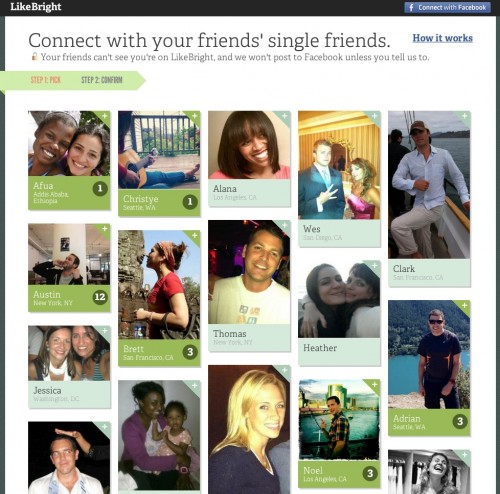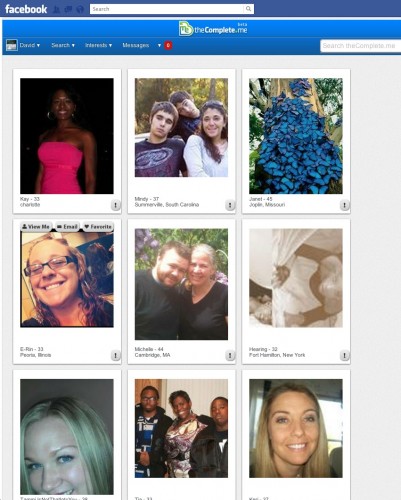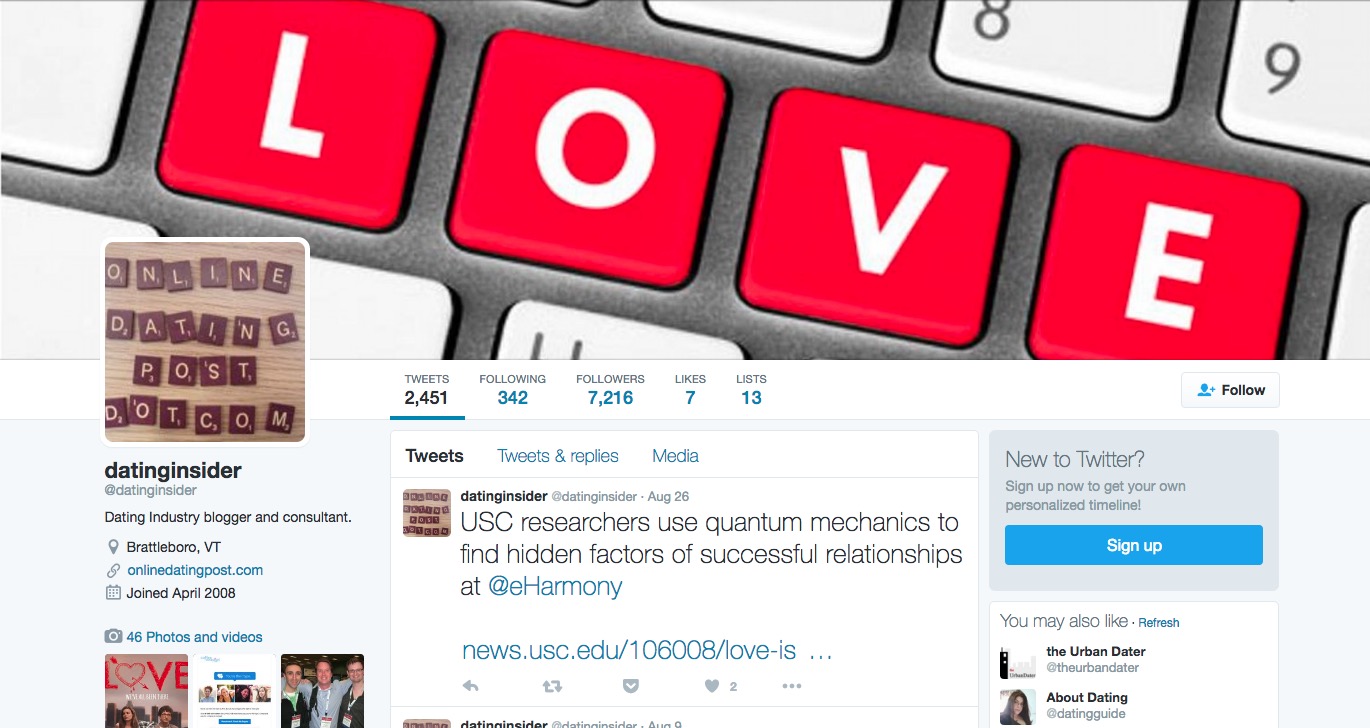
 Social dating, you’re either building a social dating site, you’re on a social dating site, or you don’t know what it means and don’t care. If you’re curious, two leading examples of social dating sites are TheCompleteMe and LikeBright.
Social dating, you’re either building a social dating site, you’re on a social dating site, or you don’t know what it means and don’t care. If you’re curious, two leading examples of social dating sites are TheCompleteMe and LikeBright.
Social dating sites see who your friends-of-friends are and makes an assumption about who they think you should be introduced to.
TheCompleteMe and Likebright are almost identical in terms of how people are displayed (think Pintrest), and while LikeBrite has a very cool vouching system, TheCompleteMe is more based on shared interests, you can see who’s single, who like Italy, and who’s on Are You Interested.
Likebright is polished and does two things well (discovery and vouching), whereas TheCompleteMe has more search functionality but the service is still searching for an identity (and a stable platform). Likebright shows me a page of singles no matter what I do, whereas TheCompleteMe says I have no single friends on Facebook in the US. Granted, both sites are very young and prone to misfires, which is understandable up to a point.
I’l do a more in-depth review of Likebright and theCompleteMe later, today I’m going to talk about social dating and ask questions about it, because I’m still trying to get a handle on what it means for singles and the dating industry.
What I do know is that it will be fun to watch the two competitors evolve side by side. Earlier examples of social dating have already flamed out or are living on the back burner. Now we have two competitors poised to battle it out for the leadership of the social dating marketing. It’s like Zoosk and Are You Interested all over again. There are other social dating apps out there, I haven’t come across any which have the mix of talent, experience, and ability (funds) to stay in business while they smash their heads against the wall for a year figuring out how this whole social dating thing works.
I just realized something, there could be a million little niche social dating sites too! Someone go design a hosted white label solution and own that marketplace. Why in the world would you settle on one monolithic dating service to satisfy you relationship needs when you can have access to 1,000 social dating sites, each as large as your friends-of-friends network?
I don’t think either Likebright or TheCompleteMe will enjoy the viral boost that Facebook gave them back in the day. They’re going to have to buy ads just like everyone else, which is a huge unavoidable cost, no matter how many friends of friends are signing up. Burning through millions of VC dollars trying to get enough people signed up to hit that magical inflection point where a site really takes off, and then the media does its job, my head hurts just thinking about it. Do you really think Grindr would be a big deal if the media didn’t fawn all over it nonstop for a year?
Just in case you don’t feel the social dating love yet, I hear you. Its healthy to view social dating as a buzzword, because thats exactly what it is. Nobody knows anything, its all posturing and promises (and egos), which is what makes it so much fun to watch play out. Who’s full of it and who’s the real deal? Who’s going to blow up so large that they make HowAboutWe and Zoosk look like bunts?
Creating a new system that launches millions of meaningful relationships is practically impossible, whereas throwing together a Badoo clone takes a few weeks. Whats more important, making money back for investors, or changing the way people are introduced to each other? Nobody talkes about that in the beginning, but at some point someone’s gotta get paid. Just ask Zuck.
I experienced social dating yesterday. While I was lying on the floor trying not to throw up after a hot and humid ass-kicking bootcamp session, my teacher texted me the contact info for another student she thought I should go out on a date with. I didn’t need Facebook, I needed to get out and about and try something new and get out of my comfort zone (bootcamp is not really something I’m all that excited about). So there’s that.
Now I have these new dating apps to use, where I have access to thousands of women through my friends. But how will I ever know which ones I should message? Thats easy, if you want a decent primer about what the social dating concept is built upon, read How Facebook Knows What You Really Like.
In essence, Open Graph is a means of grabbing all sorts of information Facebook users generate on third-party services and feeding it back into the Facebook machine. It’s a way of sharing this all this information with your network of online friends — and it’s what Zuckerberg was referring to when he said the company seeks to change how the world listens to music and watches movies.
In the case of Open Graph, the task is to weed through the mountains of data streaming from outside operations and serve up only the stuff that’s most relevant. The system works in two stages. First, it seeks to determine how interesting a certain type data would be to Facebook’s audience as a whole. Then, using this global rating as a starting point, it tries to determine how important the data is to you in particular.
Here’s where things get tricky. It’s the eHarmony matching system black-box all over again. Dating Site ABC imports people and likes based on Facebook’s social graph. Easy and done. But then what? These companies are too small to have psychologists on board that know which data (I like House, The Beatles, Florida and thousands of other things) and turn them into information that can be used. No site can match on all of them. They have to pick a subset of likes and use those. So which ones to they select? Who’s in charge of “seeding the algorithm?” or is it just a best-guess scenario?
Match is really good at creating composites of specific demographics. They don’t match the specific Dave Evans with women of a particular type, they see me coming and apply a specific search criteria based on all the other dudes that are similar to me. At least that’s how I understand it to work. What is the analog to the Match composite user in the social dating space?
Does social dating need a test like 16PF5, or will they rely solely user likes and behavior? Dave picks short and wide brunettes who live in even-numbered zip codes and part their hair on the right, so show him those people in his zip code. See how I snuck in that bit about parsing profile photos and using as data? Yup, thats happening too, on a very small scale.
What is compatible behavior? What is incompatible behavior? Who decides? Right now the main thing that social dating sites have on their side is that they can see what someone changes their relationship status. How else are they going to know that a certain matching methodology works best???
Am I over-thinking things? What if social dating turns out to be like Badoo? Breezy-style “here are some people for you to check out, we’re not going to break a sweat here, just get them in front of you, rate ’em and leave it to you to do the hard work.” Thats $150 million a year right there. Is a super-matching algorithm going to beat that in terms of revenue? Probably not for a long time. Badoo, so-so site is, ran away with an entire market, created and stole that puppy right out from under the dating industry’s eyes. Its a great story, a dating industry case study for the ages.
Matching on tastes and preferences- everyone is all worked up about matching on musical tastes. Unless she likes death metal and I like country, I just don’t see the value. Its not a strong enough primary signal to work with, more like a secondary datapoint, weighted accordingly. Tastebuds and other niche music matching systems will argue this point, which I welcome, show me the data that says you are effective at matching people based on musical tastes.
So what *do* social dating sites consider primary matching points? Do they have any idea what they are doing, or is it a land grab in the beginning, get the media attention and free publicity of being the next big dating thing, and then coasting from there on Big Ad Spend? Yeah, I thought so too.
What are these social dating sites going to use to filter down the thousands of women friends of my friends on Facebook? Will they go the distance and start defining Facebook actions to work to their favor?
Just because you have access to a lot of my personal information doesn’t make it any easier to match me with someone. Thats the battleground right there. Otherwise, the 500 women on POF in my area are going to show up in my social dating app, because we have the same friend networks. Exclusionary filters are going to be key, its just as important to not show me the usual suspects as it is to surface, or connect me with fresh faces.
Social dating is a misnomer, just like online dating. Its social discovery and (sometimes) introductions. Social dating sites haven’t figured out how to use the middleman as an introduction, he’s just an edge in the social graph, but he’s the person with all the power. A very powerful edge that remains untapped besides generic “this person is cool” vouching. Lots of growth in this area has to happen for social dating to have any real value to singles.
Just like in real life, online your friends can make or break your love life.
Guess what? You don’t need a lot of fancy Facebook API magic to learn about people. Email companies know a heck of a lot about you just from looking at your email address: Bayesian Flooding and Facebook Manipulation.
Lots of social dating startup scenarios to watch play out over the next few years. Anyone who thinks they have it figured out probably bought Facebook stock last Friday.

